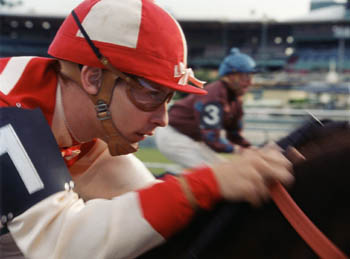![[Metroactive Movies]](/movies/gifs/movies468.gif)
[ Movies Index | Show Times | Silicon Valley | Metroactive Home | Archives ]

Remember the Mane: Tobey Maguire urges his steed on to victory in 'Seabiscuit.' Horsepower 'Seabiscuit' runs a class race all the way THERE MUST have been something in the integrity of the book Seabiscuit that infected director Gary Ross. Even the backstory of how Laura Hillenbrand's bestseller was written is one of those tales of human triumph you'd feel like hooting off the screen. The author, as she detailed in the July 7 issue of The New Yorker, had been bedridden for 10 years with a harrowing case of chronic fatigue syndrome. In her book, Ross tells the epic story of the champion horse of the 1930s, a rejected nag who became a four-legged celebrity. A self-made Northern California millionaire named Charles Howard (Jeff Bridges) believes he can make money from a half-blind, irascible jockey (co-producer Tobey Maguire), a cowpoke trainer (Chris Cooper, brilliant as always) and a horse with a bad résumé. Ross' off-kilterness comes out in an early sequence. The death of a child is told as follows: shot of car accident, shot of Bridges as the doting father, getting the news by telephone; shot of a car sunk in mud and water, with insects playing on the steering wheel; shot of father clutching son's muddy body on his porch. Watching this sequence, all you can think is: the emergency services people called and said, your son's dead in the mud, go get him. There are other moments where Ross' storytelling is just as illogical: a scene in which Maguire's jockey, Red Pollard, gets into a drunken brawl in Tijuana; Pollard's proposal to drop his family heirloom books off a bridge, seemingly for no reason. The film's narrator, historian David McCullough (who hosts the TV show American Experience), puts Seabiscuit in historical context with the stock market crash and the Depression. As a strategy, this works about half the time. As we move further from the past, all points in history seem to converge. However, that doesn't mean that Ross should imply that Seabiscuit helped form the WPA. (And just think, if the horse had gone to Yalta, we might not have lost Eastern Europe.) I liked the comic interludes of a snazzy race commentator named "Tick-Tock" McGlaughlin, played by William H. Macy like a cornball lost member of the Hoosier Hot Shots. And Ross doesn't amp things up in the dramatic sequences. The honorable solitude of the characters keeps them distinct. Even in the final moment, at a risky race at Santa Anita, Bridges--superb here--balances unaffected heartiness with an inner distance, greeting old friends but keeping his eye on the horizon all the time. The racing sequences are phenomenal, stressing not brute energy but precision, the science it takes to "jockey for position" and to live through the peril of a thoroughbred race. In these knuckle-biting sequences, we see not only the union of horse and man but also their opposition. These races deliver the thrill-ride energy almost everything in the movies lacks this year. It has to be said that Seabiscuit looks hastily whittled--at nearly three hours, it's rough-hewn. If Ross ever releases a director's cut on DVD, let's hope for less, rather than more. Still, this film is triumphant, without manipulation. Despite the claims it makes for Seabiscuit's inspirational powers, it doesn't put a halo around the horse.
Seabiscuit (PG-13), directed by Gary Ross, written by Ross, based on the book by Laura Hillenbrand, photographed by John Schwartzman and starring Jeff Bridges, Tobey Maguire and Chris Cooper opens Friday valleywide.
Send a letter to the editor about this story to letters@metronews.com. [ Silicon Valley | Metroactive Home | Archives ]
|
From the July 24-30, 2003 issue of Metro, Silicon Valley's Weekly Newspaper.
Copyright © Metro Publishing Inc. Metroactive is affiliated with the Boulevards Network.
For more information about the San Jose/Silicon Valley area, visit sanjose.com.